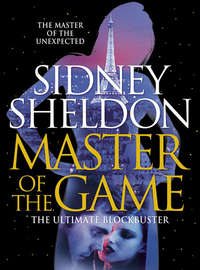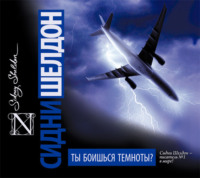
Полная версия
The Doomsday Conspiracy
Janus looked around the enormous greenhouse they were standing in. It was filled with plants and exotic flowers that rainbowed the room. The mixture of perfumes was overpowering.
“Everything in this room is alive,” Professor Rachman said. “These plants can feel love, hate, pain, excitement … just as animals do. Sir Jagadis Chandra Bose proved that they respond to a tone of voice.”
“How does one prove something like that?” Janus asked.
“I will be happy to demonstrate.” Rachman walked over to a table covered with plants. Beside the table was a polygraph machine. Rachman lifted one of the electrodes and attached it to a plant. The needle on the dial of the polygraph was at rest. “Watch,” he said.
He leaned closer to the plant and whispered, “I think you are very beautiful. You are more beautiful than all the other plants here …”
Janus watched the needle move ever so slightly.
Suddenly, Professor Rachman screamed at the plant, “You are ugly! You are going to die! Do you hear me? You are going to die!”
The needle began to quiver, then it moved sharply upward.
“My God,” Janus said. “I can't believe it.”
“What you see,” Rachman said, “is the equivalent of a human being screaming. National magazines have published articles about these experiments. One of the most interesting was a blind experiment conducted by six students. One of them, unknown to the others, was chosen to walk into a room with two plants, one of them wired to a polygraph. He completely destroyed the other plant. Later, one by one, the students were sent into the room to pass by the plants. When the innocent students walked in, the polygraph registered nothing. But the moment the guilty one appeared, the needle on the polygraph shot up.”
“That's incredible.”
“But true. We've also learned that plants respond to different kinds of music.”
“Different kinds?”
“Yes. They did an experiment at Temple Buell College in Denver where healthy flowers were put in three separate glass cases. Acid rock was piped into one, soft East Indian sitar music was piped into the second, and the third had no music. A CBS camera crew recorded the experiment using time-lapse photography. At the end of two weeks, the flowers exposed to the rock music were dead, the group with no music was growing normally, and the ones that heard the sitar music had turned into beautiful blooms, with flowers and stems reaching toward the source of the sound. Walter Cronkite ran the film on his news show. If you wish to check it, it was on October 26, 1970.”
“Are you saying plants have an intelligence?”
“They breathe, and eat, and reproduce. They can feel pain, and they can utilize defenses against their enemies. For example, terpenes are used by certain plants to poison the soil around them and to discourage competitors. Other plants exude alkaloids to make them unpalatable to insects. We've proved that plants communicate with one another by pheromones.”
“Yes. I've heard of that,” Janus said.
“Some plants are meat eaters. The venus flytrap, for example. Certain orchids look and smell like female bees, to decoy male bees. Others resemble female wasps to attract the males to visit them and pick up pollen. Another type of orchid has an aroma like rotting meat to coax carrion flies in the neighborhood to come to them.”
Janus was listening to every word.
“The pink lady's-slipper has a hinged upper lip that closes when a bee lands, and traps it. The only escape is through a narrow passageway out the rear, and as the bee fights its way to freedom, it picks up a cap of pollen. There are five thousand flowering plants that grow in the Northeast, and each species has its own characteristics. There is no doubt about it. It's been proven over and over that living plants have an intelligence.”
Janus was thinking: And the missing alien is at large somewhere.
Chapter Eleven
DAY THREE
Bern, Switzerland
Wednesday, October 17
Bern was one of Robert's favorite cities. It was an elegant town, filled with lovely monuments and beautiful old stone buildings dating back to the eighteenth century. It was the capital of Switzerland and one of its most prosperous cities, and Robert wondered whether the fact that the streetcars were green had anything to do with the color of money. He had found that the Berners were more easygoing than the citizens from other parts of Switzerland. They moved more deliberately, spoke more slowly, and were generally calmer. He had worked in Bern several times in the past with the Swiss Secret Service, operating out of their headquarters at Waisenhausplatz. He had friends there who could have been helpful, but his instructions were clear. Puzzling, but clear.
It took fifteen phone calls for Robert to locate the garage that towed the photographer's car. It was a small garage located on Fribourgstrasse, and the mechanic, Fritz Mandel, was also the owner. Mandel appeared to be in his late forties, with a gaunt, acne-pitted face, a thin body, and an enormous beer belly. He was working down in the pit of the grease rack when Robert arrived.
“Good afternoon,” Robert called.
Mandel looked up. “Guten Tag. What can I do for you?”
“I'm interested in a car you towed in Sunday.”
“Just a minute till I finish this up.”
Ten minutes later, Mandel climbed out of the pit and wiped his oily hands on a filthy cloth.
“You're the one who called this morning. Was there some complaint about that tow job?” Mandel asked. “I'm not responsible for—”
“No,” Robert reassured him. “Not at all. I'm conducting a survey, and I'm interested in the driver of the car.”
“Come into the office.”
The two men went into the small office, and Mandel opened a file cabinet. “Last Sunday, you said?”
“That's right.”
Mandel took out a card. “Ja. That was the Arschficker who took our picture in front of that UFO.”
Robert's palms felt suddenly moist. “You saw the UFO?”
“Ja. I almost brachte aus.”
“Can you describe it?”
Mandel shuddered. “It—it seemed alive.”
“I beg your pardon?”
“I mean … there was a kind of light around it. It kept changing colors. It looked blue … then green … I don't know. It's hard to describe. And there were these little creatures inside. Not human, but—” He broke off.
“How many?”
“Two.”
“Were they alive?”
“They looked dead to me.” He mopped his brow. “I'm glad you believe me. I tried to tell my friends, and they laughed at me. Even my wife thought I had been drinking. But I know what I saw.”
“About the car you towed …” Robert said.
“Ja. The Renault. It had an oil leak, and the bearings burned out. The tow job cost a hundred and twenty-five francs. I charge double on Sundays.”
“Did the driver pay by check or credit card?”
“I don't take checks, and I don't take no credit cards. He paid in cash.”
“Swiss francs?”
“Pounds.”
“Are you sure?”
“Yes. I remember I had to check the rate of exchange.”
“Mr. Mandel, do you happen to have a record of the license number of the car?”
“Of course.” Mandel said. He glanced down at the card. “It was a rental. Avis. He rented it in Geneva.”
“Would you mind giving me that license number?”
“Sure, why not?” He wrote the number down on a piece of paper and handed it to Robert. “What is this all about, anyway? The UFO thing?”
“No,” Robert said, in his sincerest voice. He took out his wallet and pulled out an identification card. “I'm with the IAC, the International Auto Club. My company is doing a survey on tow trucks.”
“Oh.”
Robert walked out of the garage and thought dazedly, It looks like we have a fucking UFO with two dead aliens on our hands. Then why had General Hilliard lied to him when he knew Robert would discover that it was a flying saucer that had crashed?
There could only be one explanation, and Robert felt a sudden, cold chill.
Chapter Twelve
The huge mother ship floated noiselessly through dark space, seemingly motionless, traveling at twenty-two thousand miles an hour in exact synchronization with the orbit of the earth. The six aliens aboard were studying the three-dimensional field-of-view optical screen that covered one wall of the spaceship. On the monitor, as the planet Earth rotated, they watched holographic pictures of what lay below while an electronic spectrograph analyzed the chemical components of the images that appeared. The atmosphere of the land masses they overflew was heavily polluted. Huge factories befouled the air with thick, black, poisonous gases while unbiodegradable refuse was dumped into landfills and into the seas.
The aliens looked down at the oceans, once pristine and blue, now black with oil and brown with scum. The coral of the Great Barrier Reef was turning bleach-white, and fish were dying by the billions. Where trees had been stripped in the Amazon rain forest, there was a huge, barren crater. The instruments on the spaceship indicated that the earth's temperature had risen since their last exploration three years earlier. They could see wars being waged on the planet below, which spewed new poisons into the atmosphere.
The aliens communicated by mental telepathy.
Nothing has changed with the earthlings.
It is a pity. They have learned nothing.
We will teach them.
Have you tried to reach the others?
Yes. Something is wrong. There is no reply.
You must keep trying. We must find the ship.
On earth, thousands of feet below the spaceship's orbit, Robert placed a call from a secure phone to General Hilliard. He came on the line almost immediately.
“Good afternoon, Commander. Do you have anything to report?”
Yes. I would like to report that you are a lying sonofabitch. “About that weather balloon, General … it seems to have turned out to be a UFO.” He waited.
“Yes, I know. There were important security reasons why I couldn't tell you everything earlier.”
Bureaucratic double-talk. There was a short silence.
General Hilliard said, “I'm going to tell you something in the strictest confidence, Commander. Our government had an encounter with extraterrestrials three years ago. They landed at one of our NATO air bases. We were able to communicate with them.”
Robert felt his heart begin to beat faster. “What—what did they say?”
“That they intended to destroy us.”
He felt a shock go through him. “Destroy us?”
“Exactly. They said they were coming back to take over this planet and make slaves of us, and that there is nothing we can do to prevent them. Not yet. But we're working on ways to stop them. That's why it's imperative that we avoid a public panic so we can buy time. I think you can understand now why it's so important that the witnesses are warned not to discuss what they saw. If word of the Idents, as we refer to them, leaked out, it would be a worldwide disaster.”
“You don't think it would be better to prepare people and—?”
“Commander, in 1938, a young actor named Orson Welles broadcast a radio play called ‘War of the Worlds’ about aliens invading the earth. Within minutes there was panic in cities all over America. A hysterical population tried to flee from the imaginary invaders. The telephone lines were jammed, the highways were clogged. People were killed. There was total chaos. No, we have to be prepared for the aliens before we go public with this. We want you to find those witnesses for their own protection, so we can keep this under control.”
Robert found that he was perspiring. “Yes. I—I understand.”
“Good. I gather you've talked to one of the witnesses?”
“I've found two of them.”
“Their names?”
“Hans Beckerman—he was the driver of the tour bus. He lives in Kappel …”
“And the second?”
“Fritz Mandel. He owns his own garage in Bern. He was the mechanic who towed the car of a third witness.”
“The name of that witness?”
“I don't have it yet. I'm working on it. Would you like me to speak with them about not discussing this UFO business with anyone?”
“Negative. Your assignment is simply to locate the witnesses. After that we'll let their respective governments deal with them. Have you learned how many witnesses there are?”
“Yes. Seven passengers plus the driver, the mechanic, and a passing motorist.”
“You must locate them all. Each and every one of the ten witnesses who saw the crash. Understood?”
“Yes, General.”
Robert replaced the receiver, his mind in a whirl. UFOs were real. The aliens were enemies. It was a horrifying thought.
Suddenly, the uneasy feeling Robert had had earlier returned in full force. General Hilliard had given him this assignment, but they had not told him everything. What else were they holding back?
The Avis rental-car company is located at 44 Rue de Lausanne in the heart of Geneva. Robert stormed into the office and approached a woman behind the desk.
“May I help you?”
Robert slammed down the piece of paper with the license number of the Renault written on it. “You rented this car out last week. I want the name of the person who rented it.” His voice was angry.
The clerk drew back. “I'm sorry, we are not permitted to give out that information.”
“Well, that's just too bad,” Robert retorted, “because in that case, I'm going to have to sue your company for a great deal of money.”
“I do not understand. What is the problem?”
“I'll tell you what the problem is, lady. Last Sunday this car ran into mine on the highway and did a hell of a lot of damage. I managed to get his license number, but the man drove away before I could stop him.”
“I see.” The clerk studied Robert a moment. “Excuse me, please.” She disappeared into a back room. In a few minutes when she returned, she was carrying a file. “According to our records, there was a problem with the engine of the car, but there was no report of any accident.”
“Well, I'm reporting it now. And I'm holding your company responsible for this. You're going to have to pay to have my car repaired. It's a brand-new Porsche, and it's going to cost you a fortune …”
“I'm very sorry, sir, but since the accident was not reported, we cannot take any responsibility for it.”
“Look,” Robert said in a more reasonable tone of voice, “I want to be fair. I don't want to hold your company responsible. All I want to do is have that man pay for the damage he did to my car. It was a hit-and-run. I may even have to bring the police into this. If you give me the man's name and address, I can talk directly to him, and we can settle it between us and leave your company out of it. Is that fair enough?”
The clerk stood there, making up her mind. “Yes. We would much prefer that.” She looked down at the file in her hand. “The name of the person who rented the car is Leslie Mothershed.”
“And his address?”
“Two thirteen A Grove Road, Whitechapel, London, East Three.” She looked up. “You are certain our company will not be involved in any litigation?”
“You have my word on it,” Robert assured her. “This is a private matter between Leslie Mothershed and me.”
Commander Robert Bellamy was on the next Swissair flight to London.
He sat in the dark alone, concentrating, meticulously going over every phase of the plan, making certain that there were no loopholes, that nothing could go wrong. His thoughts were interrupted by the soft buzz of the telephone.
“Janus here.”
“Janus. General Hilliard.”
“Proceed.”
“Commander Bellamy has located the first two witnesses.”
“Very good. Have it attended to immediately.”
“Yes, sir.”
“Where is the commander now?”
“On his way to London. He should have number three confirmed shortly.”
“I will alert the committee as to his progress. Continue to keep me informed. The condition of this operation must remain Nova Red.”
“Understood, sir. I would suggest—”
The line was dead.
FLASH MESSAGE
TOP SECRET ULTRA
NSA TO DEPUTY DIRECTOR BUNDESANWALTSCHAFT
EYES ONLY
COPY ONE OF (ONE) COPIES
SUBJECT: OPERATION DOOMSDAY
1. HANS BECKERMAN—KAPPEL
2. FRITZ MANDEL—BERN
END OF MESSAGE
Chapter Thirteen
At midnight in a small farmhouse fifteen miles from Uetendorf, the Lagenfeld family was disturbed by a series of strange events. The older child was awakened by a shimmering yellow light shining through his bedroom window. When he got up to investigate, the light had disappeared.
In the yard, Tozzi, their German shepherd, began barking furiously, awakening old man Lagenfeld. Reluctantly, the farmer got out of bed to quiet the animal, and when he stepped outside he heard the sound of frightened sheep crashing against their pen, trying to escape. As Lagenfeld passed the trough, which had been filled to the brim by the recent rainfall, he noticed that it was bone dry.
Tozzi came running to his side, whimpering. Lagenfeld absently patted the animal on the head. “It's all right, boy. It's all right.”
And at that moment, every light in the house went out. When the farmer returned to the house and picked up the telephone to call the power company, the phone was dead.
If the lights had remained on a moment longer, the farmer might have seen a strangely beautiful woman walk out of his barnyard and into the field beyond.
Chapter Fourteen
The Bundesanwaltschaft—Geneva
1300 Hours
The government minister seated in the inner sanctum of the headquarters of the Swiss intelligence agency watched the deputy director finish reading the message. He put the message in a folder marked Top Secret, placed the folder in the desk drawer, and locked the drawer.
“Hans Beckerman und Fritz Mandel.”
“Ja.”
“No problem, Herr Minister. It shall be taken care of.”
“Gut.”
“Wann?”
“Sofort. Immediately.”
The following morning on his way to work, Hans Beckerman's ulcers were bothering him. I should have pushed that reporter fellow to pay me for that thing I found on the ground. These magazines are all rich. I probably could have gotten a few hundred marks. Then I could have gone to a decent doctor and had my ulcers taken care of.
He was driving past Turler Lake, when ahead of him, at the side of the highway, he saw a woman waving, trying to get a lift. Beckerman slowed down to get a better look at her. She was young and attractive. Hans pulled over to the side of the road. The woman approached the car.
“Guten Tag,” Beckerman said. “Can I help you?” She was even prettier close up.
“Danke.” She had a Swiss accent. “I had a fight with my boyfriend, and he dropped me here in the middle of nowhere.”
“Tsk, tsk. That's terrible.”
“Would you mind giving me a lift into Zurich?”
“Not at all. Get in, get in.”
The hitchhiker opened the door and climbed in beside him. “This is very kind of you,” she said. “My name is Karen.”
“Hans.” He started driving.
“I don't know what I would have done if you hadn't come along, Hans.”
“Oh, I'm sure someone else would have picked up a pretty woman like you.”
She moved closer to him. “But I'll bet he wouldn't have been as good looking as you.”
He glanced over at her. “Ja?”
“I think you are very handsome.”
He smiled. “You should tell that to my wife.”
“Oh, you're married.” She sounded disappointed. “Why is it all the wonderful men are married? You look very intelligent, too.”
He sat up straighter.
“To tell you the truth, I'm sorry I ever got involved with my boyfriend.” She shifted around in her seat, and her skirt climbed up her thigh. He tried not to look. “I like older, mature men, Hans. I think they're much more sexy than young men.” She snuggled up against him. “Do you like sex, Hans?”
He cleared his throat. “Do I—? Well, you know … I'm a man …”
“I can see that,” she said. She stroked his thigh. “Can I tell you something? That fight with my boyfriend made me very horny. Would you like me to make love to you?”
He could not believe his luck. She was a beauty, and from what he could see, she had a great body. He swallowed. “I would, but I'm on my way to work and—”
“It will only take a few minutes.” She smiled. “There's a side road up ahead that leads into the woods. Why don't we stop there?”
He could feel himself getting excited. Sicher. Wait until I tell the boys at the office about this! They'll never believe it.
“Sure. Why not?” Hans turned the car off the highway and took the little dirt road that led into a grove where they could not be seen by passing motorists.
She slowly ran her hand up his thigh. “Mein Gott, you have strong legs.”
“I was a runner when I was younger,” Beckerman boasted.
“Let's get your trousers off.” She undid his belt and helped him slide his pants down. He was already tumescent.
“Ach! Ein grosser!” She began to stroke him.
He moaned, “Leck mich doch am Schwanz.”
“You like to be kissed down there?”
“Ja.” His wife never did that for him.
“Gut. Now just relax.”
Beckerman sighed and closed his eyes. Her soft hands were caressing his balls. He felt the sharp sting of a needle in his thigh, and his eyes flew open. “Wie—?”
His body stiffened, and his eyes bulged out. He was choking, unable to breathe. The woman watched as Beckerman slumped over the steering wheel. She got out of the car and slid his body into the passenger seat, then got behind the wheel of the car and drove back down the dirt road onto the highway. At the edge of the steep mountain road, she waited until the road was clear, then opened the door, stepped on the gas pedal, and as the car started to move, she jumped. She stood there watching the car tumble down the steep cliff. Five minutes later, a black limousine pulled up beside her.
“Irgendwelche Problem?”
“Keins.”
Fritz Mandel was in his office ready to close the garage when two men approached.
“I'm sorry,” he said, “I'm closing. I can't—”
One of the men interrupted. “Our car is stuck down the highway. Kaputt! We need a tow.”
“My wife is waiting for me. We are having company tonight. I can give you the name of another—”
“It's worth two hundred dollars to us. We're in a hurry.”
“Two hundred dollars?”
“Yes. And our car is in pretty bad shape. We'd like you to do some work on it. That would probably come to another two, three hundred.”
Mandel was becoming interested. “Ja?”
“It's a Rolls,” one of the men said. “Let's see the kind of equipment you have here.” They walked into the service area and stood at the edge of the pit. “That's pretty good equipment.”
“Yes, sir,” Mandel said proudly. “The very best.”
The stranger took out a wallet. “Here. I can give you some money in advance.” He removed some bills and handed them to Mandel. As he did so, the wallet slipped out of his hands and fell down into the pit. “Verflucht!”








